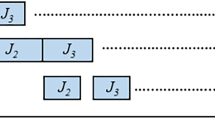Abstract
We consider the problem of scheduling intervals on m identical machines where each interval can be seen as a job with fixed start and end time. The goal is to accept a maximum cardinality subset of the given intervals and assign these intervals to the machines subject to the constraint that no two intervals assigned to the same machine overlap. We analyze an online version of this problem where, initially, a set of n potential intervals and an upper bound k on the number of failing intervals is given. If an interval fails, it can be accepted neither by the online algorithm nor by the adversary. An online algorithm learns that an interval fails at the time when it is supposed to be started. If a non-failing interval is accepted, it cannot be aborted and must be processed non-preemptively until completion. For different settings of this problem, we present deterministic and randomized online algorithms and prove lower bounds on the competitive ratio.








Similar content being viewed by others
Notes
Naturally, the problem can be modeled as a longest path problem. Since the graph is directed and acyclic, this is equivalent to a shortest path problem (by reversing the signs of all arc weights).
Formally, the number of machines m is also part of the instance. However, we will sometimes slightly abuse notation and say that an instance \(\sigma \) is processed on m machines.
Note that it can happen that some of the intervals we ignored in the first iteration are not ignored anymore in the second iteration.
Here, \(\hat{\sigma } \subseteq \sigma \) means that \(I(\hat{\sigma }) \subseteq I(\sigma )\) and \(F(\hat{\sigma }) \subseteq F(\sigma ) \cap I(\hat{\sigma })\).
Forbidding an algorithm to accept some intervals does not change the argumentation presented in the paragraph subsequent to (9).
The argumentation for Observation 2 carries over to \(\overline{\textsc {alg}^m}\).
References
Antoniadis, A., & Huang, C. C. (2013). Non-preemptive speed scaling. Journal of Scheduling, 16(4), 385–394.
Arkin, E. M., & Silverberg, E. B. (1987). Scheduling jobs with fixed start and end times. Discrete Applied Mathematics, 18(1), 1–8.
Bar-Noy, A., & Schieber, B. (1991). The canadian traveller problem. In: Proceedings of the 2nd ACM-SIAM Symposium on Discrete Algorithms (SODA), pp. 261–270.
Borodin, A., & El-Yaniv, R. (1998). Online computation and competitive analysis. Cambridge: Cambridge University Press.
Bouzina, K. I., & Emmons, H. (1996). Interval scheduling on identical machines. Journal of Global Optimization, 9(3–4), 379–393.
Canetti, R., & Irani, S. (1998). Bounding the power of preemption in randomized scheduling. SIAM Journal on Computing, 27(4), 993–1015.
Carlisle, M. C., & Lloyd, E. L. (1995). On the \(k\)-coloring of intervals. Discrete Applied Mathematics, 59(3), 225–235.
Epstein, L., Jez, L., Sgall, J., & van Stee, R. (2013). Online scheduling of jobs with fixed start times on related machines. In: Proceedings of the 16th International Workshop on Approximation Algorithms for Combinatorial Optimization (APPROX), LNCS, vol. 7408, pp. 134–145.
Epstein, L., & Levin, A. (2010). Improved randomized results for the interval selection problem. Theoretical Computer Science, 411(34–36), 3129–3135.
Faigle, U., & Nawjin, W. M. (1995). Note on scheduling intervals online. Discrete Applied Mathematics, 58(1), 13–17.
Fleischer, L., Goemans, M. X., Mirrokni, V. S., & Sviridenko, M. (2011). Tight approximation algorithms for maximum general assignment problems. Mathematics of Operations Research, 36(3), 416–431.
Fung, S. P. Y., Poon, C. K., & Zheng, F. (2009). Improved randomized online scheduling of unit length intervals and jobs. In: Proceeding of the 6th Workshop on Approximation and Online Algorithms (WAOA), pp. 53–66.
Gupta, U. I., Lee, D. T., & Leung, J. Y. T. (1979). An optimal solution for the channel-assignment problem. IEEE Transactions on Computers, 28(11), 807–810.
Huang, C. C., & Ott, S. (2014). New results for non-preemptive speed scaling. In: Proceedings of the 38th International Symposium on Mathematical Foundations of Computer Science (MFCS), pp. 360–371.
Im, S., & Wang, Y. (2011). Secretary problems: Laminar matroid and interval scheduling. In: Proceedings of the 22nd ACM-SIAM Symposium on Discrete Algorithms (SODA), pp. 1265–1274.
Khandekar, R., Schieber, B., Shachnai, H., & Tamir, T. (2014). Real-time scheduling to minimize machine busy times. Journal of Scheduling pp. 1–13.
Kolen, A. W. J., Lenstra, J. K., Papadimitriou, C., & Spieksma, F. C. R. (2007). Interval scheduling: A survey. Naval Research Logistics, 54, 530–543.
Kovalyov, M. Y., Ng, C., & Cheng, T. C. E. (2007). Fixed interval scheduling: Models, applications, computational complexity and algorithms. European Journal of Operational Research, 178(2), 331–342.
Krumke, S. O., Thielen, C., & Westphal, S. (2011). Interval scheduling on related machines. Computers and Operations Research, 38(12), 1836–1844.
Lipton, R. J., & Tomkins, A. (1994). Online interval scheduling. In: Proceedings of the 5th ACM-SIAM Symposium on Discrete Algorithms (SODA), pp. 302–311.
Long, D., & Thakur, M. (1993). Scheduling real-time disk transfers for continuous media applications. In: Proceedings of the 12th IEEE Symposium on Mass Storage Systems, pp. 227–232.
Miyazawa, H., & Erlebach, T. (2004). An improved randomized online algorithm for a weighted interval selection problem. Journal of Scheduling, 7(4), 293–311.
Seiden, S. S. (1998). Randomized online interval scheduling. Operations Research Letters, 22(4–5), 171–177.
Westphal, S. (2008). A note on the k-canadian traveller problem. Information Processing Letters, 106(3), 87–89.
Woeginger, G. J. (1994). Online scheduling of jobs with fixed start and end times. Theoretical Computer Science, 130(1), 5–16.
Yao, A. C. C. (1977). Probabilistic computations: Toward a unified measure of complexity (extended abstract). In: Proceedings of the 18th Annual IEEE Symposium on the Foundations of Computer Science (FOCS), pp. 222–227.
Acknowledgements
We would like to thank Tjark Vredeveld for his helpful comments on this work, especially regarding the deterministic algorithm for multiple machines.
The first author was partially supported by the German Research Foundation (DFG), Grant GRK 1703/1 “Resource Efficiency in Interorganizational Networks.”
Author information
Authors and Affiliations
Corresponding author
Rights and permissions
About this article
Cite this article
Bender, M., Thielen, C. & Westphal, S. Online interval scheduling with a bounded number of failures. J Sched 20, 443–457 (2017). https://doi.org/10.1007/s10951-016-0506-9
Published:
Issue Date:
DOI: https://doi.org/10.1007/s10951-016-0506-9




